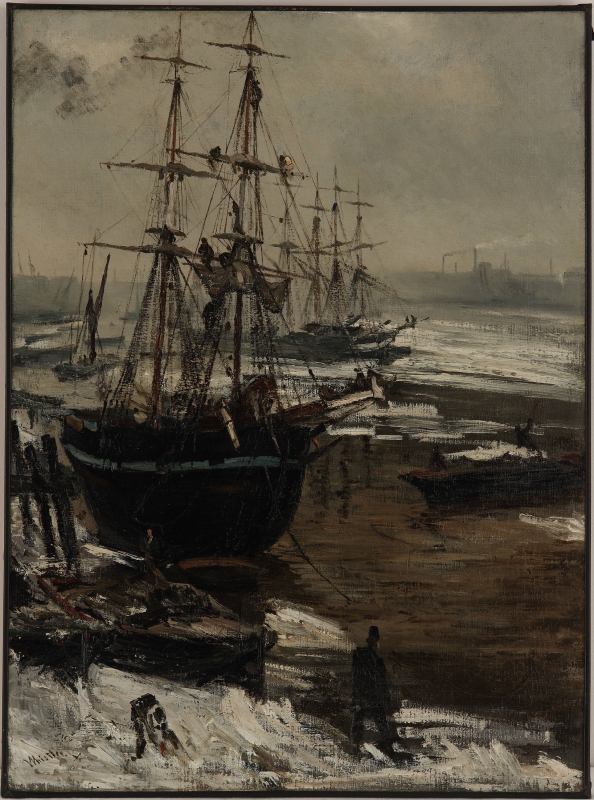Titles
Several possible titles have been suggested:
- 'The Twenty-fifth of December, 1860, on the Thames' (1862, Royal Academy). 1
- 'the Thames Ice Sketch' (1862, Whistler). 2
- 'Sur la Tamise; l'Hiver' (1867, Salon, Paris). 3
- 'Ships in the ice, Thames' (1878, Whistler). 4
- 'Thames in Ice' (1898, ISSPG). 5
- 'La Tamise gelée. – (The Thames in Ice.)' (1905, Palais de l'Ecole des Beaux-Arts, Paris). 6
- 'The Thames in Ice' (1980, YMSM). 7
'The Thames in Ice' is the generally accepted title.
Description
A view across a half-frozen river, in vertical format. One man stands on the snowy shore in the centre foreground, and one is bending over at lower left. A barge behind them, at left, is surrounded by ice. Behind this, at left and in the middle distance, are two and three-masted ships, the nearest two-master having a conspicuous blue band painted around it. At right, a barge is approaching the two-master, and the two bargees appear to be fending off the ice as they approach. In the distance, the warehouses are dark grey under a grey sky.
Site
According to the Pennells, Whistler painted The Thames in Ice from an inn at Cherry Gardens in Bermondsey, the same inn, The Angel, from which he painted Wapping [YMSM 035]. 8
Curry identifies the ship as 'a flat-bottomed collier brig, used to transport heavy cargoes up the tidal river to London'. The flat bottom enabled it to be beached and unloaded at low tide. It was too big to sail beyond London bridge. Windlasses on the broad masts facilitated the unloading of goods into small boats (lighters) alongside. Curry contrasts this with the 'spindly masts' of the sea-going sailing ship moored in mid-stream, and with the smoky factories on the far shore, 'hallmarks of the industrial revolution,' describing the whole as 'a frozen moment from modern life in London on a wintry day in 1860.' 9
Notes:
1: 94th Exhibition of the Royal Academy of Arts, London, 1862 (cat. no. 114).
2: Whistler to G. A. Lucas, 26 June [1862], GUW #11977.
3: 85th exhibition Salon de 1867, Palais des Champs Elysées, Paris, 1867 (cat. no. 1562).
4: Whistler to J. A. Rose, [November 1878], GUW #08784.
5: Exhibition of International Art, International Society of Sculptors, Painters and Gravers, Knightsbridge, London, 1898 (cat. no. 175).
6: Œuvres de James McNeill Whistler, Palais de l'Ecole des Beaux-Arts, Paris, 1905 (cat. no. 57).
7: YMSM 1980 [more] (cat. no. 36).
Last updated: 6th February 2021 by Margaret







